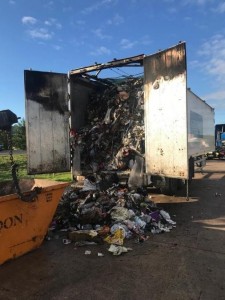Waste management and recycling specialist Grundon is urging businesses to take extra care when disposing of lithium batteries, particularly those in disposal vapes, following a spate of potentially dangerous incidents.
The firm, which works with businesses across Bristol from its depot in St Philip’s, has managed dozens of cases of incorrect disposal at its sites and on vehicles this year, including several fires. 
While all Grundon’s bases are equipped with fire detection and suppression systems, it says any fires on board its vehicles when they are out collecting waste could pose significant threats to its employees and the public.
As a result, it is recommending businesses to separate any batteries from waste streams so they can be sent for recycling.
Grundon’s recently appointed risk and sustainability director, Toni Robinson, pictured, said the problem was likely to intensify over the Christmas period.
“Batteries become essential during the festive season – no electronic gift or light-up tree topper is complete without them,” she said.
“Last year, 6bn batteries were thrown away, including over 1.1bn electricals containing hidden lithium-ion batteries.
“Notably, vaping has become increasingly popular across the UK, with an estimated 3.6m Brits now using them.
“Of these, 20% opt for disposable vapes which, like many festive decorations, rely on lithium batteries and contain various materials that pose recycling challenges.” 
She said the seasonal surge in battery usage could have serious consequences if the batteries were incorrectly disposed of in general waste or mixed recycling.
So far this year, Grundon’s material recovery facilities (MRFs) recorded more than 50 incidents caused by improper disposal of lithium batteries.
“These batteries can be crushed during processing, and some batteries, like lithium-ion, have the potential to explode or ignite, posing a severe risk to waste facility workers,” Toni added.
“In an ideal world, everyone would be separating them, which then allows them to be handled in a safe manner.
Unfortunately, too many people don’t appreciate the need to do this and often it’s not easy to do, as the battery can be integrated into the design of the product. 
“For example, vapes with internal batteries are encased within the device and cannot be easily removed or replaced.
“As a society, we need to think more sustainably and try to buy goods that last longer and have batteries that can be changed. This way, used batteries can be easily recycled.”
So said separating batteries from waste streams not only ensured they did not cause any harm, but also meant valuable materials, such as lithium, cobalt and manganese, could be recovered.
“If batteries are sent for recycling, then up to 95% can be recovered, which makes perfect sense,” she added.
She also welcomed the government’s announcement that disposable vapes will be banned from next June.
Berkshire-headquartered Grundon was launched in 1929 and today works with customers across the South of England to provide a total waste management service for the reduction, reuse, recycling, recovering and disposal of waste.
Since opening its St Philips depot, it has secured a number of waste management contracts across Bristol with organisations such as Bristol Zoo Project, the immersive visitor attraction Wake The Tiger, Gloucestershire Cricket Club and Bristol Golf Centre.
It has also introduced a £300,000 state-of-the-art electric collection vehicle to the city’s streets.






























